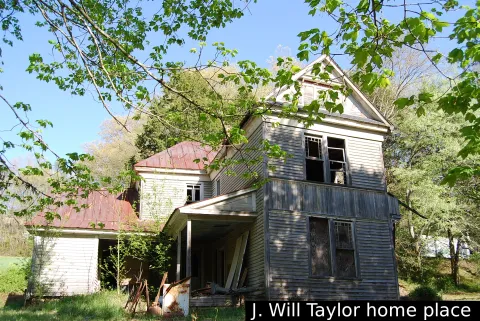Congressman J. Will Taylor, A Man for the People

Fifty years ago East Tennessee was but a little advanced. It was covered with a thick wood, and its precipitous mountains formed barriers to contact with the outside world.
Communities large and small remained unto themselves and; consequently, it was among the last sections of the country to benefit by the progress of civilization. Thus, it developed a homespun philosophy and code that are reflected today in the scrupulous integrity and rugged morality of the natives. They are almost a people apart.
They worship at the family alter, they attend church reverently, they molest no one, nor will they be molested. They believe in one religion, one political faith and one love. In a trade or bargain as in politics, their word is a guarantee of the faithful performance of the contract. Shrewd and conservative, to be a leader among them one must be of their blood and sinew.
It was of such stock that J. Will Taylor sprang, and in such an atmosphere was he born and reared. (Excerpt from Hillbilly Bill, a Biography of the Hon. J. Will Taylor. Published 1932.)
For many years, a trip east down Asheville Highway could not be accomplished without crossing the J. Will Taylor Bridge. I often fielded the question of “Who was J. Will Taylor” to others riding in my vehicle.
After decades of wear and tear, that bridge has been replaced with a new version. The old bridge may soon be forgotten, along with the man himself. However, a truer patriot may never be found.
Congressman J. Will Taylor was a product of the public school system. His years spent studying law at Cumberland University in Lebanon date back more than a century. His travels included a trek most of us wouldn’t take in order to win the lottery, much less to attend school.
Taylor’s mode of transportation to Lebanon was astride a mule across the hills to the Powell River. In his lap, he carried a trunk measuring 18 inches by 12 inches by 2 feet in length. The trunk held most of his worldly possessions.
Upon reaching the river, Taylor would board a log raft and assisted the oarsman as payment for the crossing. After arriving in Clinton, Taylor climbed the bank with trunk in tow to catch the train for Lebanon.
After completing his law degree, Taylor opened his first law office in LaFollette in 1902. While practicing in LaFollette, Taylor served as postmaster, mayor, insurance commissioner for the state of Tennessee and chair of the Republican state executive committee. He declared his intention to seek the Republican nomination for Congress from the second District in March of 1918. By March of 1919, Taylor held the seat in the U.S. Congress where he served 10 consecutive terms until his death in 1939.
During those terms, Taylor was an uncompromising Republican and advisor to presidents Coolidge and Hoover. He was held in such high esteem that even those who opposed him were quoted as saying they honored and respected him personally and admired his courage and frankness. It was said that no other Tennessee Congressman before him had the ear of his people, as did Taylor. He knew the people and they knew and trusted him. The services he rendered to his constituents were without equal and not confined to any class.
The memorial service for Taylor was so extensive there is an entire book containing the memorial addresses delivered in Congress for him when he passed. The crowds attending his funeral were so enormous it was reported that every county in the state of Tennessee was represented.
Taylor’s home place in Lead Mine Bend is in disrepair but still standing, and is one of the most historically significant houses in Union County, if for no other reason than that it was home to a man well loved by the people he served.
- Log in to post comments